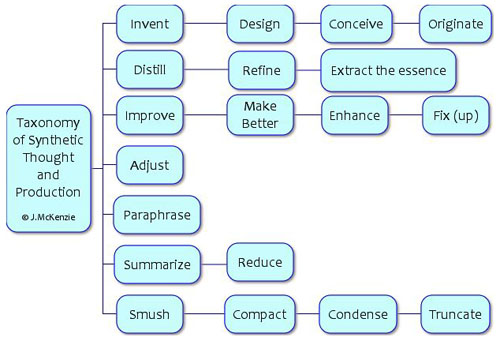The 2010 FNO Hong Kong Mini Conference
|
||
 |
How can we best equip the young with the thinking, problem-solving and inquiry skills they will need in this century? Hosted at The South Island International School, the seminar extends over two days in a series of hands-on laptop experiences that model the strategies we might employ with students. The school is situated half way down Nam Fung Road mid way between Wong Nai Chung gap and Wong Chuk Hang. |
|
|
|
|
|
You can register and pay on line for this conference at
http://fno.org/fnopress/books.html |
|
Schedule of Events |
| Monday, April 26, 2010 |
|
8:45 AM - Registration 9:00 AM - Noon (Coffee and pastries will be served mid morning.) Skills for this CenturyMany groups have put forth documents outlining skills they see as especially important during this new century characterized by new technologies and many pressing social and ecological challenges. Jamie presents an overview of key documents such as the New Zealand Curriculum and curriculum statements from Australia, Canada and the United States to highlight the most promising and the most difficult of these new century skills. He also points out important skills and attitudes missed by these documents. Finally, he calls upon the audience to consider the professional development required to help all teachers address such goals successfully. Beauty and the Beast: Using Digital Riches to Enhance LearningLong an advocate of using new technologies in smart ways to deepen and enhance student thinking, communicating, inventing and problem-solving, Jamie will provide examples of ways that digital resources can take students to the highest levels of Bloom's Taxonomy as well as a new Taxonomy Jamie has created to measure the level of originality and synthesis shown in student work. He will also touch briefly on the limitations of digital life, pointing to Thoreau's words, Reading Across a Dozen LiteraciesAt a time when some have tried to define "literacy" narrowly, Jamie proposes that we look at "reading" quite broadly, asking how we can further the comprehension skills of all our students whether they be reading a poem, someone's face or the story captured by a photograph or painting. Given the rich offerings available through the online world, he argues this broader conception of reading allows schools to deliver on the historical notion of "reading across the curriculum." Noon - 1:00 PM 1:00 PM - 4:00 PM Teaching Media Literacy in an Age of Wikilobbying, Spin, Tabloid Journalism and the Photoshopping of RealityHow do young people learn what is happening in their world when the media has turned dramatically from the reporting of news to a focus on scandal, celebrity gossip and disasters of various kinds? In this presentation Jamie gives examples of spin, Wikilobbying and the photoshopping of reality while providing an overview of how schools might make media literacy an important element in the curriculum. Learning Advertising & Propaganda TechniquesTaking advantage of excellent resources from groups such as the New Mexico Media Literacy Project, Jamie shows how students beginning in elementary school may be taught a list of advertising and propaganda techniques that should inoculate them against manipulation. Flickring Heights - Using Digital Photography to Spark Student InventionJamie shows how the taking and the editing of photographs with digital tools and software can help students clarify what it means to see, to capture and to report things with a fresh perspective. He suggests engaging students in taking a daily photograph similar to the 365 projects on Flickr and shows how that kind of learning with digital photography can transfer benefits into other domains such as writing, thinking and research. Participants will come equipped with digital cameras and editing software so they can learn first hand what it means to create fresh and original images that communicate powerfully. |
| Tuesday, April 27, 2010 |
|
8:45 AM - Registration 9:00 AM - Noon (Coffee and pastries will be served mid morning.) Studying Complex Concepts such as Beauty, Truth and Courage in DepthStudents are rarely challenged to dig down deep in order to create rich definitions of complex ideas. In this session Jamie shows how teachers can use a series of digital explorations to deepen and extend students' understanding of such concepts. Students learn that dictionaries usually pay short shrift to complex ideas, and they even learn to improve the definitions they encounter. Participants will taste a number of these explorations in hands-on activities. Advanced Mindmapping for Extended Investigations:
The value of mindmapping, especially when thinking about solutions to problems, lies in the careful identification of linkages. The mere generation of dozens of questions does not, in itself, fuel understanding and innovative thinking. In this session, Jamie engages the group in using Inspiration™ to map out the important relationships and questions needed to come up with a plan to reduce the danger of floods, the press of traffic or the handling of serious disease. Participants may also use SmartIdeas™ if they wish, but demonstrations will be with Inspiration™ Noon - 1:00 PM A Taxonomy of Synthetic Thought and ProductionIn this session, Jamie explains how his new Taxonomy can help teachers and their students determine the degree to which a particular production is original or is merely a knock-off, imitation or copy. For those placing a high priority on originality this is a Taxonomy that will inspire and guide student work in powerful ways.
Creating New Ideas and Possibilities through Lateral Thinking and Wandering PurposefullyLittle attention is devoted in most schools to what Edward DeBono has called "lateral thinking" - the exploration of unusual possibilities, yet it is precisely this kind of thinking that fuels innovation, invention and activities like disaster planning. In this session, Jamie provides a rationale for developing this kind of thinking and shares strategies that teachers may employ to nurture both the attitudes and skills required so they are capable of "thinking outside the box." Teaching the Art of Intuitive ThinkingIntuitive thinking gets little recognition or respect from higher ed, yet countries like New Zealand have identified it as an important element in smart decision-making. How can we teach students to draw upon intuition without relying too heavily on "their gut?' In this session Jamie will show how students will " . . . reflect on their own learning, draw on personal knowledge and intuitions, ask questions, and challenge the basis of assumptions and perceptions" in line with the NZ curriculum.
|
|



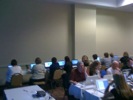



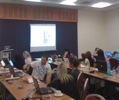



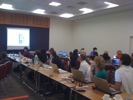


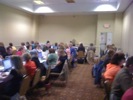
 Connecting the Dots - Mindmapping that Seeks Connections, Links and Meaning
Connecting the Dots - Mindmapping that Seeks Connections, Links and Meaning